[section]
[section-item]
[row]
[column 12]

[/column]
[/row]
[/section-item]
[/section]
Electric cooperatives across the country are in the midst of a wave of senior staff turnover, as almost 20% of the sector's workforce approaches or reaches retirement age and as pandemic-driven sentiment drives many older workers to retire early.
The exodus is putting pressure on co-op leadership and boards to fill unprecedented numbers of vacancies from an increasingly constricted pool of candidates.
Leigh Taylor, head of
NRECA Executive Search, says after “a pandemic lull that created a false sense of cyclicity," it's crunch time as more co-ops are asking for help in the hunt for new CEOs. “A good search can take four to six months, but it can be a challenge when a retiring CEO doesn't provide sufficient notice."
[blockquote quote="%E2%80%9CToday%2C%20people%20can%20choose%20where%20they%20want%20to%20work%2C%20and%20they%20want%20to%20work%20for%20a%20company%20that%20cares%20and%20leadership%20that%20understands%20them.%E2%80%9D" author="Lynn%20Thompson%2C%20retired%20Eau%20Claire%20Energy%20Cooperative%20CEO" /]
One silver lining to the dilemma is a trend among co-ops to further widen the net they cast for prospective senior staff, which has led to a small but noticeable uptick in the hiring of female—and particularly young female—CEOs and general managers. About 80 co-op CEOs in 2020 were women; that's now close to 90, according to NRECA data.
“It's not a huge jump, but it's a sign of something positive," Taylor says. “And what encourages me most is knowing that this kind of trend doesn't happen by accident. There's support and encouragement and intentional development along the way. That's what we need for all of our next generation of leaders, men and women."
Many see the strengths that women often bring to leadership—teamwork, problem-solving, communication—as particularly important to the future of co-ops.
“Twenty years ago, the mentality was, 'You're working at the co-op, and you're damn lucky to have a job,'" says retired
Eau Claire Energy Cooperative CEO Lynn Thompson, who was replaced by Monica Obrycki last May after running the Wisconsin co-op for 13 years. “Today, people can choose where they want to work, and they want to work for a company that cares and leadership that understands them."
Ahead of Women's History Month in March, we talked with eight dynamic CEOs from co-ops across the country—all women 45 or younger and all hired within the past three years—about their journey to the top and their aspirations in their new role.
[section]
[section-item]
[row]
[column 12]
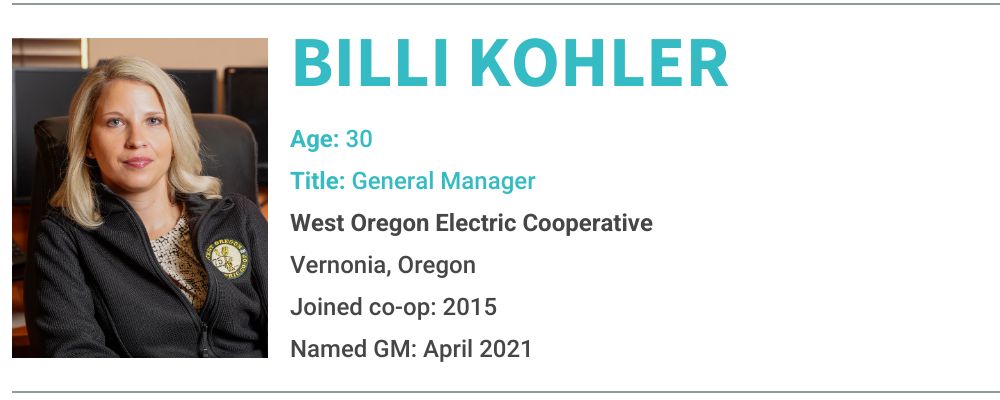
[/column]
[/row]
[/section-item]
[/section]
When
West Oregon EC was looking for a new leader in 2021, it needed someone who wouldn't blanch at overseeing a system with the state's highest electric rates and a sprawling, rugged service area of 1,224 square miles. The answer was right in front of them: Billi Kohler, who's now one of the youngest general managers in the entire co-op network.
Kohler started at WOEC as a file clerk for high school credit and then for pay before she began college. When she was hired in 2015 as a member services rep, CEO Bob Perry noticed Kohler's knack for defusing difficult situations while shouldering more responsibility. He resolved to “pour everything I had into helping her excel."
[image-caption title="Photo%20by%20Mike%20Teegarden%2FPioneer%20Utility%20Resources" description="%20" image="%2Fremagazine%2Farticles%2FPublishingImages%2Fkohler-story.JPG" /]
The co-op helped Kohler finish her bachelor's degree and promoted her twice. As administrative services manager, when Kohler wasn't managing member services and HR, she was working with the chief financial officer on accounting and Perry on board relations. That wide-ranging experience “gave me the confidence to move forward. Being as small as we are, I had been a little bit of everywhere in the co-op."
Her ground-up perspective led her to push for big improvements, including mending relationships with members frustrated with high bills and working with technology co-op NRTC on a 10-year plan to update geographic information systems and metering equipment. Kohler is ambitious (“I'm the kind of person that if an opportunity presents itself, I'm going to try it"), but she also wants to take the time to make West Oregon EC the best it can be. “My career goal is to stay where I'm at, fighting the good fight for my little co-op."
[section]
[section-item]
[row]
[column 12]
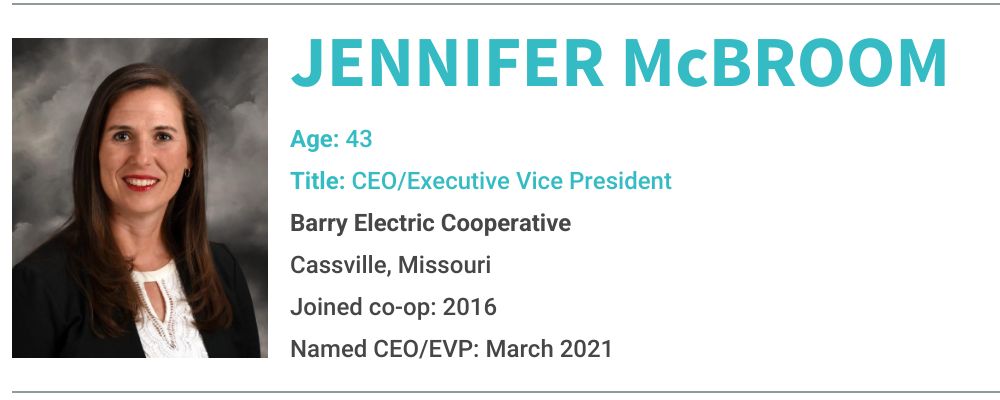
[/column]
[/row]
[/section-item]
[/section]
When Jennifer McBroom came to
Barry Electric Cooperative, she brought 18 years of experience as a credit officer at community banks in Missouri and Tennessee. The transition from banking to electric co-ops was a smooth one. “Co-ops are the anchor institutions in small, rural communities, and I heard [Barry EC] was a great place to work. I like to be active in the community, and a smaller environment was a better fit for me.”
McBroom got off to a strong start as the co-op’s new chief financial officer. Within a few months, she mastered the complicated Rural Utilities Service accounting program while supervising a staff of four and gaining a reputation as a manager who brought out the best in people. When then-CEO Bill Shiveley announced his retirement in 2017, “Jennifer would have been a good replacement, but the only problem was she only had a year and half of experience at the time,” he said. After the co-op’s first pick for CEO didn’t work out, Shiveley came out of retirement for about eight months to mentor McBroom.
[image-caption title="Photo%20courtesy%20Jennifer%20McBroom" description="%20" image="%2Fremagazine%2Farticles%2FPublishingImages%2Fmcbroom-statefair.JPG" /]
“Just walking in the door, I could tell the difference,” he says. “The atmosphere was just completely different. People respected her and trusted her.”
McBroom says her strategy of “listening and learning and understanding that I’m not the expert” is helping her navigate many challenges, including addressing the co-op’s aging infrastructure and running its fiber subsidiary. “We have a good team of people here. One of my favorite quotes is, ‘A leader who fails to listen eventually has no one there to listen to them.’”
[section]
[section-item]
[row]
[column 12]
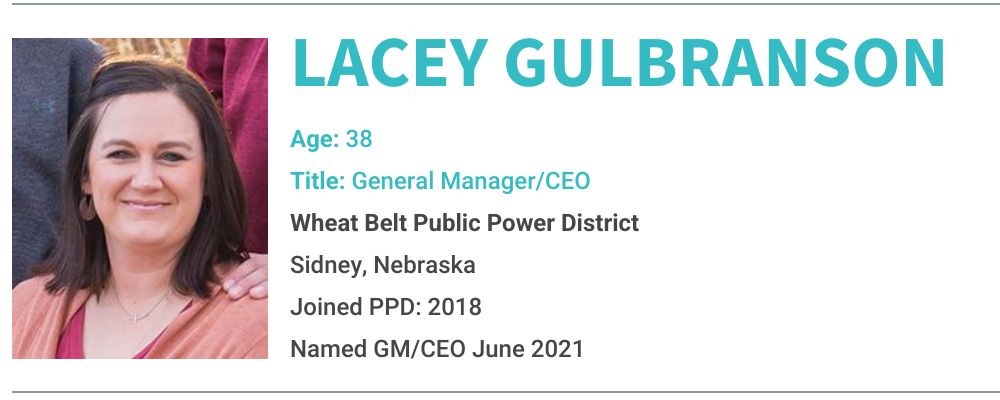
[/column]
[/row]
[/section-item]
[/section]
As a 10-year-old on her family’s alfalfa farm in Nebraska, one of Lacey Gulbranson’s chores was taking a four-wheeler to read the operation’s 10 electric meters so her mother could pay the power bill. “I’m a farm girl; that’s what we did.” Now, as a PPD general manager and CEO, she’s on the other side of the meter.
Before joining
Wheat Belt PPD in 2018, Gulbranson was a project manager at Cabela’s for 12 years until a buyout forced the outdoor retailer to leave Sidney. Gulbranson didn’t want to relocate, and when a co-worker told her about a job opening at Wheat Belt, “a dream job with fantastic people, I went home at lunch and applied.” The job changed her life.
[image-caption title="Photo%20by%20Lacey%20Gulbranson" description="%20" image="%2Fremagazine%2Farticles%2FPublishingImages%2Fgulbranson-story.JPG" /]
As an energy optimization specialist, she analyzed line losses. “She really dug in and did extra legwork to better understand the situation,” says Wheat Belt Director Toni Blomenkamp. “She really brought us up to speed on things that needed attention.”
Gulbranson got the top job permanently after a brief stint as interim CEO and is now implementing a board-approved strategic plan that includes overhauling the PPD’s culture to improve customer engagement and operational efficiencies. “We recognized that we needed a culture change and that we needed more accountability from all the employees. Lacey was the right person for a change in culture,” says director Stuart Morgan. Changes include merit raises for staff and automation of customer billing processes, among others.
“I bring a different perspective and a desire to continually think better,” she says. “There’s a learning curve, but I think the more we change, the more our employees will go through that curve a lot faster.”
[section]
[section-item]
[row]
[column 12]
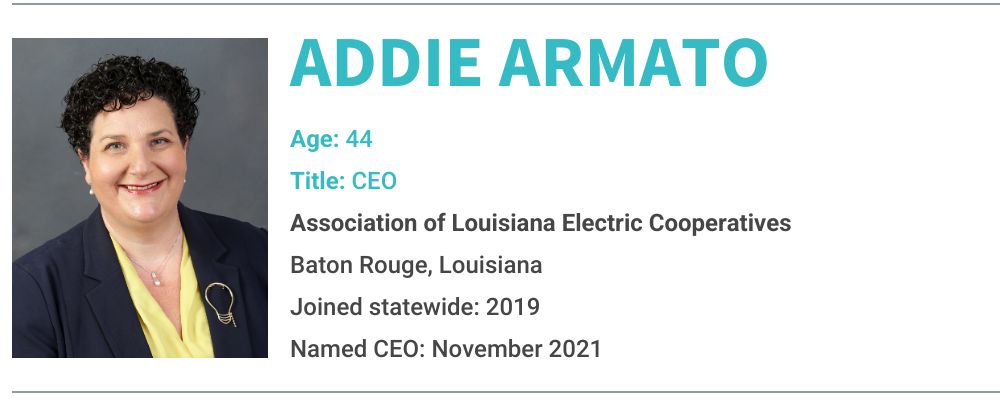
[/column]
[/row]
[/section-item]
[/section]
Growing up in New Roads, Louisiana, Addie Armato says she had two families: her biological family and her co-op family at Cajun Electric Power Cooperative, where her father, Mickey, was a plant shift supervisor.
And like all families, they went through good times and hard times, like when the G&T fell into bankruptcy, costing Mickey his job. After graduating from college in 2000, Armato remembered those family ties when she accepted a job at
Pointe Coupee EMC as its member relations and communications specialist. “Some of my best memories were of the co-op,” she says. “I loved that family atmosphere, and I missed it when I wasn’t at the co-ops” during a seven-year period when she worked for a recordkeeping firm.
[image-caption title="Photo%20courtesy%20Association%20of%20Louisiana%20Electric%20Cooperatives" description="%20" image="%2Fremagazine%2Farticles%2FPublishingImages%2Farmato-story.JPG" /]
Armato returned to the co-op world in May 2019 as director of member engagement for
the statewide association, stepped in as interim CEO in August 2021 and got the top job three months later. Steadfast support from mentors and talents in communications and relationship-building helped her rise through the ranks. Her reputation as a communications expert in the aftermath of multiple hurricanes is a hard-earned badge of honor.
In 2020 and 2021, after Hurricanes Laura, Delta and Ida pummeled the state, she donned work boots and spent weeks living with line crews in tent cities fielding questions from reporters and the public. Armato “is good at deploying information and getting it where it needs to be,” says ALEC Director J.R. Hickman. “She’s been through the ranks, gets right in there and sets the woods on fire.”
One of Armato’s goals as CEO is to speed up access to federal disaster aid for co-ops. “I have seen our people when they’re at the lowest of the low, their systems are 100% out, and some employees have lost their homes. These disasters create lasting effects on our cooperatives and the communities they serve. Because I care about our cooperatives and their employees, I just want to help any way I can.”
[section]
[section-item]
[row]
[column 12]
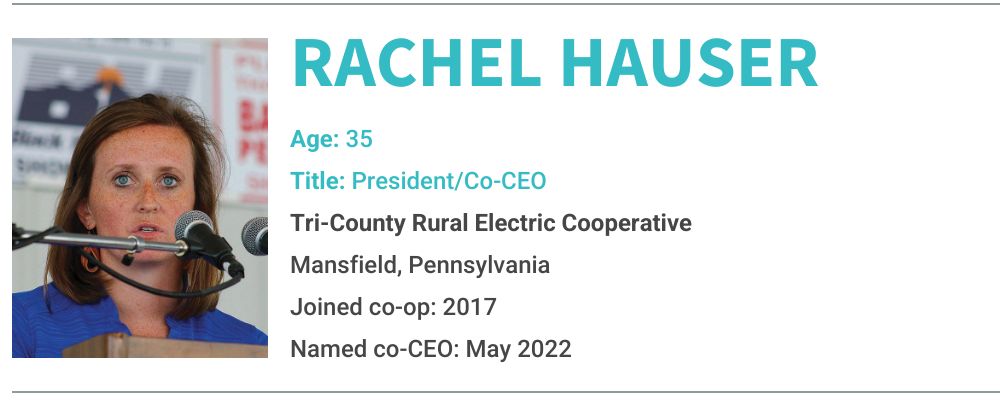
[/column]
[/row]
[/section-item]
[/section]
Rachel Hauser made her mark at
Tri-County REC shortly after she joined as an executive assistant and project specialist in 2017 by bringing in $64 million in public funds for the co-op’s broadband subsidiary. “I needed somebody who could work with lobbyists, state legislators, congressional staffers and regulators. She can read the room and is comfortable with hard chargers and the co-op culture,” says then-CEO Craig Eccher.
Hauser’s experience on Capitol Hill as executive assistant for Pennsylvania Rep. Glenn Thompson and her track record as a grant writer at a regional economic development organization fit the bill. Eccher saw a leader in Hauser and had her testify on his behalf before state regulators for funding. “She had to articulate before state regulators and legislators that a rural electric co-op could actually operate a fiber company and that it was in a community’s best interest,” Eccher says. “The governor’s office got behind it with $17 million, he liked it so much.”
[image-caption title="Photo%20by%20Jeff%20Fetzer" description="%20" image="%2Fremagazine%2Farticles%2FPublishingImages%2Fhauser-farmshow-story.JPG" /]
That experience reinforced her reasons for working at a co-op. “I was able to take ownership of a project that would benefit the lives of people I grew up with,” says Hauser, a 2004 Electric Cooperative Youth Tour delegate from Wysox-based
Claverack Rural Electric Cooperative. Hauser uses her political savvy to manage the relationship between the co-op, its broadband subsidiary,
Tri-Co Connections, and C&T Enterprises, a for-profit subsidiary created by Tri-County REC and Claverack REC.
Aware of the age gap between her and some of the co-op’s 60 employees, Hauser makes a conscious effort to “understand their perspectives. At other companies when I had a manager, it was very difficult for me if I felt like they didn’t take my opinions seriously,” she says. “To get respect, you need to give respect, and the only way to do that is by finding the time to sit down with them and understand what they do.”
[section]
[section-item]
[row]
[column 12]
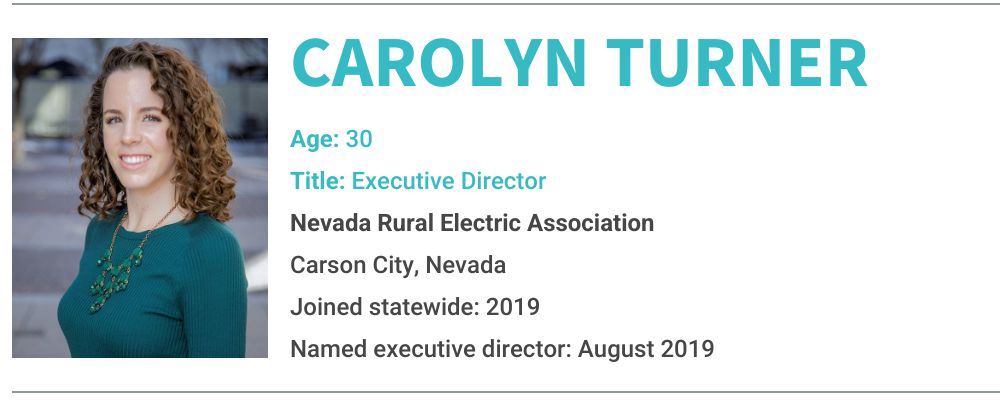
[/column]
[/row]
[/section-item]
[/section]
Carolyn Turner is making history in several ways. She is the
Nevada Rural Electric Association’s first full-time executive director and also its first employee. “The statewide manager had always been a contract position,” she says. “I happened to be in the right place at the right time when my predecessor announced he was ready to retire.”
While timing was a factor in Turner’s entry into the co-op network, utility leaders saw her promise as a rising star working on increasingly high-profile cases at a prestigious government relations firm and made a deliberate effort to recruit her for the job. “I can absolutely tell you, Carolyn is one of these individuals who could be anything she wants to be,” says David Luttrell, former board president of the Nevada statewide.
[image-caption title="Photo%20courtesy%20Nevada%20Rural%20Electric%20Association" description="%20" image="%2Fremagazine%2Farticles%2FPublishingImages%2Fturner-story.JPG" /]
In 2018, NREA’s manager announced plans to retire, and Nevada’s co-ops had to act quickly. “My big concern was, would she be interested in working for a small association over a big-time lobbyist firm?” Luttrell says. Turner didn’t need much convincing. “Co-ops have such a compelling story. Their commitment to community and the ties that bind them stand apart from other organizations,” she says.
Co-op managers throughout the state invested time recruiting and developing Turner as a leader—often driving hundreds of miles through their service territories with Turner in the passenger seat. That “intentionality” by senior leaders, says Turner, is important if women are to advance at co-ops—and elsewhere. “Work ethic is critical to success in this industry,” Turner says. “And if you can prove that you’re passionate about the issues, you have every right to go after leadership positions, no matter your sex.”
[section]
[section-item]
[row]
[column 12]
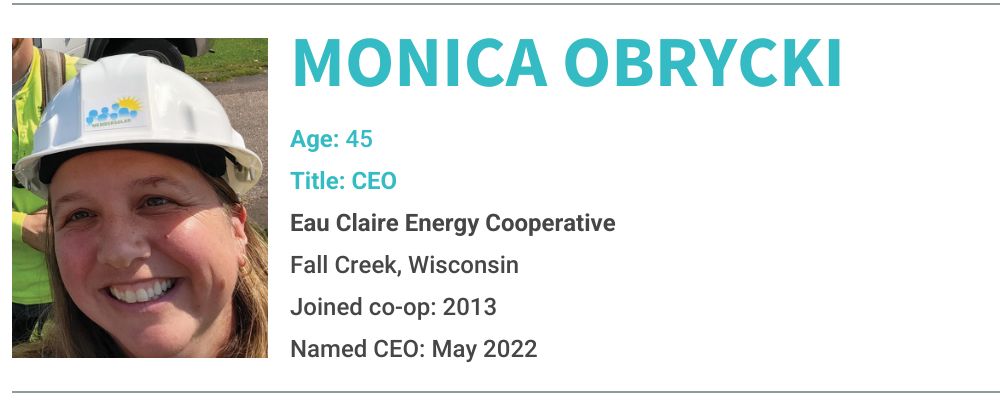
[/column]
[/row]
[/section-item]
[/section]
A thirst for learning and self-improvement gave Monica Obrycki the drive to succeed at
Eau Claire Energy Cooperative, where she became its first female co-op CEO last May, chosen from dozens of applicants.
The co-op’s tuition reimbursement program had helped her finish her bachelor’s degree, a “labor of love” over seven years. “I was very fortunate to have a leader who was very empowering and encouraged me to expand my role throughout my career,” says Obrycki of her predecessor, Lynn Thompson. Obrycki joined the co-op as an administrative assistant to the board of directors in 2013, and her portfolio expanded to include human resources and benefits and later marketing, communications and member relations after a promotion to chief administrative officer.
[image-caption title="Photo%20courtesy%20Monica%20Obrycki" description="%20" image="%2Fremagazine%2Farticles%2FPublishingImages%2Fobrycki-story.JPG" /]
“The co-op business is engineering, finance and everything else. Monica was everything else,” Thompson says. Obrycki’s mastery of communications and engagement skills “comes at a point in time in our history when attracting and keeping the right people and getting the most out of them is so important,” says Board President Clarence Boettcher.
Thompson likes to tell the story about how Obrycki coached a struggling employee to improve his performance and how he’s now become “a star performer” at the co-op. A graduate of NRECA’s Management Internship Program whose project focused on improving member engagement, Obrycki says she “thrives on representing us in the community and being engaged with our members and our employees. People and a relationship focus have been a huge part of my career.”
[section]
[section-item]
[row]
[column 12]
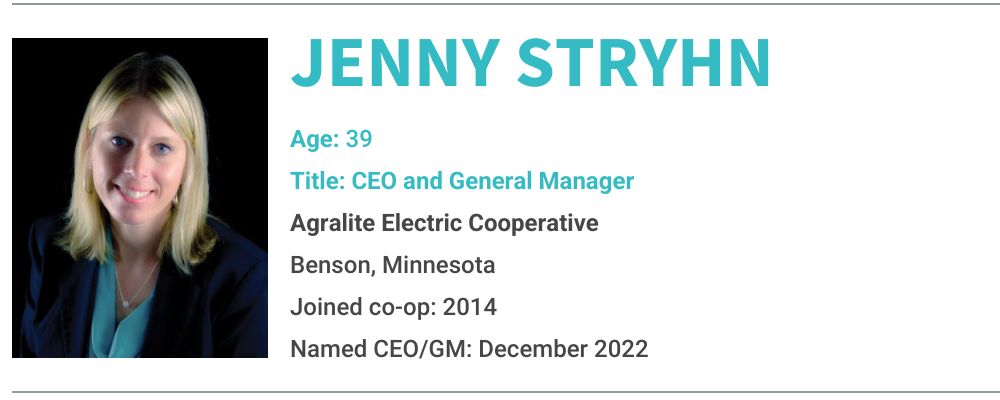
[/column]
[/row]
[/section-item]
[/section]
Retired
Agralite Electric Cooperative CEO Kory Johnson knew then-Chief Financial Officer Jenny Stryhn was a leader in the making when the co-op’s directors returned from a finance workshop a few years ago saying they would have preferred Stryhn as the instructor. “‘Send her there. She understands it and she can explain it to us,’” recalls Johnson of Stryhn, who became CEO in December 2022.
Since 2014 when Stryhn left a Wisconsin co-op to become Agralite EC’s CFO, she had been a valuable member of Johnson’s management team. She overhauled the co-op’s financial and budgeting systems, resulting in a major refinancing of Rural Utilities Service debt for $1 million in savings for members. She explored changes in wholesale power supply, worked with Johnson on rate studies and took over financial reporting duties at board meetings. Stryhn says those experiences, plus NRECA training, helped her thrive.
[image-caption title="Photo%20courtesy%20Jenny%20Stryhn" description="%20" image="%2Fremagazine%2Farticles%2FPublishingImages%2Fstryhn-story.JPG" /]
Of the financial overhaul, “I was able to make that opportunity my own, enabling me to improve those programs for the cooperative and for our members.” That member focus, plus “co-ops’ culture, history and principles,” led Stryhn to leave the corporate insurance work for the co-op world in 2009, when she joined Wisconsin’s
Pierce Pepin Cooperative Services as an accounting clerk.
Pierce Pepin’s Barb Bee taught Stryhn about RUS loans, capital credits and other points of electric co-op finance. A quick learner, “each task you gave Jenny, she was able to find a way to do it and do it even better,” Bee says. While at the Wisconsin co-op, Stryhn earned her MBA while raising a young family with her husband. “Jenny’s the prime example that you can be successful all around in life.”
